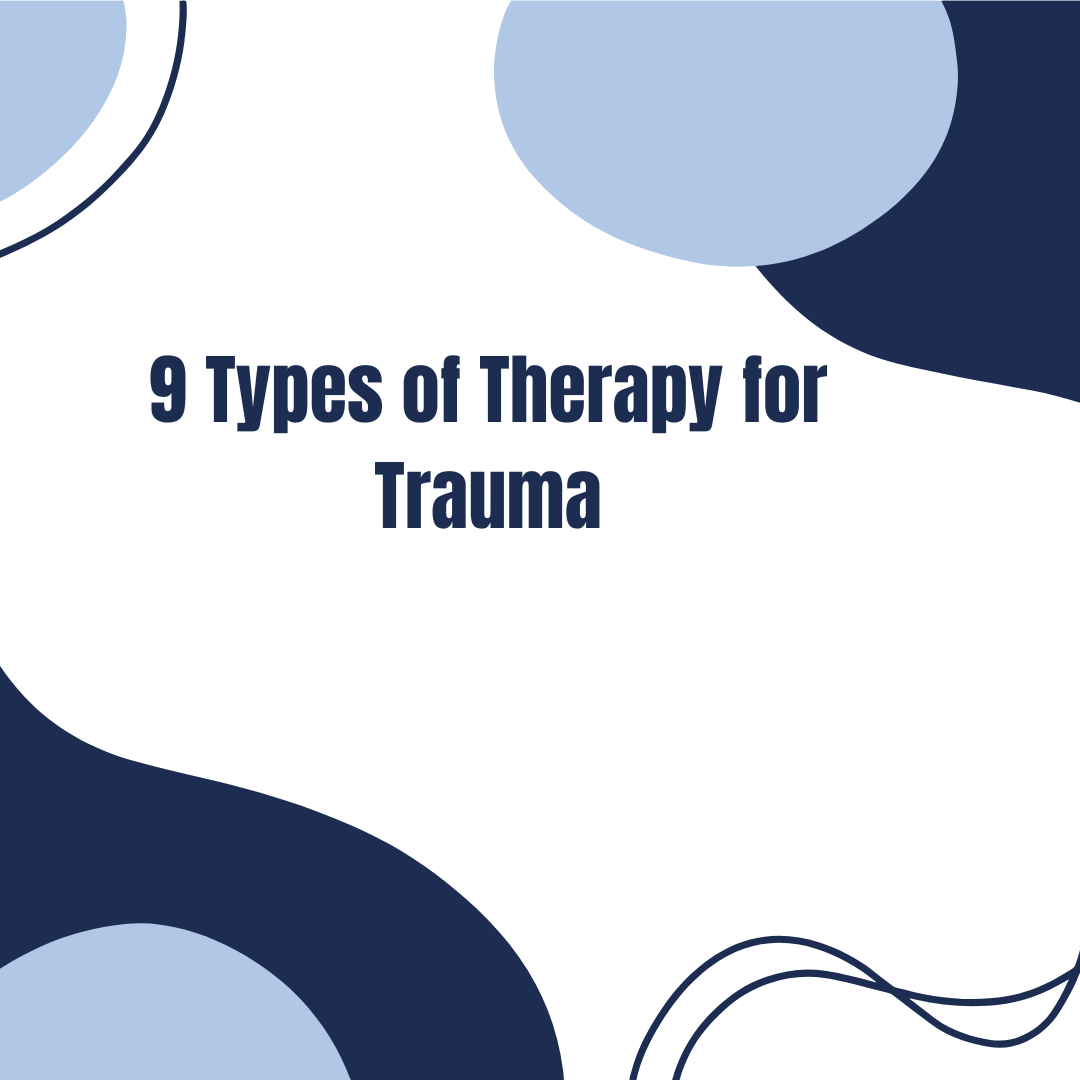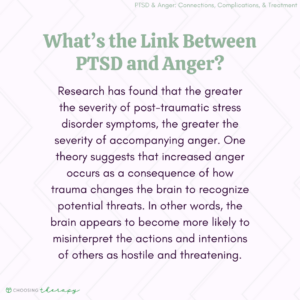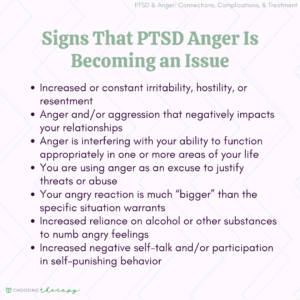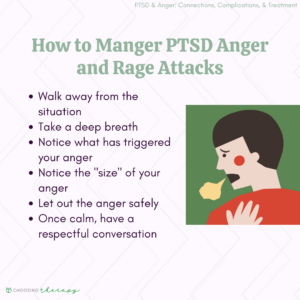Anger, one of the most prevalent PTSD symptoms, is often experienced more intensely by trauma survivors.1 PTSD anger may be expressed both outwardly and internally, sometimes resulting in increased hypervigilance, aggression, self-harm, suicidality, or self-hatred. These symptoms can greatly impact a person’s life and relationships, as well as be a source of significant distress and danger.
Online Therapy For PTSD Therapy can help you live a better life. BetterHelp provides convenient and affordable online therapy, starting at $65 per week. Take a Free Online Assessment and get matched with the right therapist for you!
What’s the Link Between PTSD & Anger?
Research has found that the greater the severity of post-traumatic stress disorder (PTSD) symptoms, the greater the severity of accompanying anger.2,3,4 One theory suggests that increased anger occurs as a consequence of how trauma changes the brain to recognize potential threats. In other words, the brain appears to become more likely to misinterpret the actions and intentions of others as hostile and threatening.5
It has further been proposed that among survivors of complex PTSD (prolonged and/or repetitive trauma), anger is often a response to changes in self-perception. Trauma can lead to feelings of shame, guilt, a sense of isolation, and perceiving oneself as permanently damaged or “not good enough.” These feelings and beliefs appear to be linked to internalized anger.6
PTSD Anger & Violence
Those with PTSD who experience a great deal of dysregulated anger are also at risk for acts of aggression towards others, making them more likely to engage in violence with interpersonal partners or those close to them. The impact of PTSD on one’s ability to manage anger is evident by how strongly-connected poor emotional regulation is to one’s ability to navigate emotions in relational contexts.
Anger & PTSD in Combat Veterans
There is a strong link between anger and PTSD in combat veterans. Due to the environmental nature and constant exposure to violence in war, combat veterans struggle with dysregulated anger. This increases their risk for angry outbursts as well as suicide. These behaviors are tied with a higher probability of risky behaviors, criminal activity, and physical aggression toward others.
Can Anger Worsen PTSD Symptoms?
When dealing with PTSD symptoms, there is a possibility that anger or irritability is an automatic response, as the body has been conditioned to respond in this way over the course of traumatic exposure. When anger becomes the go-to response, it can impact many areas of your life, including work and family.
Arousal
Anger is connected to different processes within the body. Muscles become tense and stiff as the mind and emotions enter into survival mode when reacting to a PTSD trigger. Emotional dysregulation is evident in this scenario and can feel much more intense for those with PTSD. They may be triggered easily and have a harder time coming down from the arousal, leaving them feeling on edge. One may even self-soothe by harming themself or someone else, or misusing drugs or alcohol.
Behavior
When we are dealing with anger or any kind of threat, by nature we try to protect ourselves. Those with a history of trauma often react with aggression, as this may be their only known or learned way of responding. This can leave someone behaving impulsively with little thought prior to their actions.
Thoughts & Beliefs
Those with PTSD tend to believe that there is a threat everywhere (called hypervigilance). Having their trauma experience as a baseline approach to life results in a harder time reconciling these negative, limiting beliefs. They may need help understanding how their trauma is impacting their worldview in various scenarios.
Other PTSD Symptoms That May Occur With Anger
With PTSD and anger, common symptoms include irritable behavior and angry outbursts (with little or no provocation). These are typically expressed as verbal or physical aggression toward people or objects. Another potential symptom is reckless or self-destructive behavior.2 The latter reflects inwardly expressed anger, while the former is an example of externalized anger.7 In general, men are more likely to express outward anger, while women with PTSD more often internalize their anger.5,8,9,10
Other symptoms that may appear alongside PTSD anger include:7
- Irritable behavior
- Angry outbursts
- Hostility
- Bitterness
- Resentment
- Verbal or physical aggression toward people or objects
- Reckless or self-destructive behavior
- Self-harming
- Suicidality
- Self-hatred
Help For Trauma / PTSD Talk Therapy – Get help recovering from trauma from a licensed therapist. Betterhelp offers online therapy starting at $60 per week. Free Assessment Online PTSD treatment – Talkiatry offers personalized care from psychiatrists who listen and take insurance. Get matched with a specialist in just 15 minutes. Take our assessment
PTSD & Anger in Relationships
PTSD and anger are associated with increased physical and psychological aggression, which can cause significant problems in relationships.11,12 For legitimate reasons, loved ones may become afraid of the trauma survivor’s angry and aggressive outbursts, ultimately leading to an increased sense of isolation and shame for the trauma survivor.
Physical aggression and relationship problems related to PTSD are higher among those in the military and men as opposed to civilians and women.10 Still, even civilian men with symptoms of PTSD engage in twice as many aggressive and violent acts in their intimate relationships compared to men who are not experiencing symptoms.11
Constructive & Destructive PTSD Anger
Anger as a symptom of PTSD can be used constructively or destructively. For example, it can motivate a productive discussion with someone you feel has offended you or is threatening something important to you. While uncomfortable, you can better understand their intentions and motivations, maybe even improve the relationship. Anger can also motivate you to take positive action in your community.
However, PTSD anger can feed resentment, bitterness, and hostility as well. You might use it to fuel aggression toward others in the form of verbal, psychological, physical, or sexual attacks. This will only lead to problems in all areas of your life and destroyed important relationships. Anger can be further destructive if focused inward, sometimes causing one to engage in self-harm (e.g., cutting or burning the skin), high-risk behaviors (e.g., alcohol or substance use, drunk driving, starting fights), suicidal actions, and/or self-hatred.
Signs That PTSD Anger Is Becoming an Issue
After trauma, your anger becomes a serious problem when it’s negatively impacting your relationships or if you’re using it to justify threats or acts of abuse. If you notice any signs of problematic anger, you should talk to your primary care physician (PCP) and/or a professional counselor.
Signs that your PTSD anger is becoming a problem can include:
- Increased or constant irritability, hostility, or resentment
- Anger and/or aggression that negatively impacts your relationships
- Anger is interfering with your ability to function appropriately in one or more areas of your life
- You are using anger as an excuse to justify threats or abuse
- Your angry reaction is much “bigger” than the specific situation warrants
- Increased reliance on alcohol or other substances to numb angry feelings
- Increased negative self-talk and/or participation in self-punishing behavior
How to Manger PTSD Anger & Rage Attacks
If you are finding it difficult to redirect your anger in a positive way, there are techniques and strategies to express, release, and transform how you feel. Remember, despite the fact that PTSD can be responsible for causing increased anger, it does not excuse you from personal responsibility or accountability for violent behavior.5
Here are six techniques and strategies to help you better manage your anger:
- Walk away from the situation: If possible, give yourself some physical and emotional space from a triggering situation.
- Take a deep breath: We often forget to breathe when we feel afraid or angry, so focus on your breathing for at least 60 seconds.
- Notice what has triggered your anger: Ask yourself, “What line do you feel has been crossed?” “What do you feel is being threatened?”
- Notice the “size” of your anger: If your anger seems too big in comparison to the “size” of the situation, then you’re likely being triggered. Acknowledgment can help release some of the tension.
- Let out the anger safely: If you’re able, tap into and release your anger while doing a productive physical activity. If you feel it in your lower body, consider going for a walk or run. If you feel it in your upper body, hit a punching bag or do push-ups, chest presses, or arm curls.
- Once calm, have a respectful conversation: When you’ve calmed down, return to the conversation. Focus on your observations and feelings, but avoid name-calling, blaming, and bringing up the past. Try to understand the other person’s point of view and intentions, and accept an apology if offered. Work together to find a way to move forward if needed.
PTSD & Anger Treatment Options
Treatment for PTSD often includes therapy, lifestyle changes, and medication. Try to find a mental health professional who has expertise in PTSD and anger. Together, you can discuss if medication for anger would be beneficial for your unique situation. Family or couples counseling is another option to consider if PTSD-related anger is impacting your relationships. Outside of treatment, getting enough sleep, eating regular meals, reducing unnecessary “drama” in your life, and practicing progressive relaxation are all healthy ways to reduce PTSD anger outbursts.
Therapy
PTSD symptoms of anger and aggression can greatly impact your life and relationships over time. Allowing your trauma and anger to go unresolved is not helpful. Anger management counseling programs, among others, can help you implement long-term change in the way you express your anger.13
To find the right therapist, consider getting a referral from your primary care physician or using an online therapist directory. Here, you can sort by therapist specialty and insurance coverage.
Trauma therapies that can be used for PTSD-anger include:13,14,15
- Cognitive behavioral therapy (CBT) for PTSD
- Exposure therapy
- Eye movement desensitization and reprocessing (EMDR) for PTSD
- Dialectical behavioral therapy (DBT) for PTSD
- Relaxation training
Medication
Although psychotherapy and counseling for PTSD appear to be more effective than medication, it is still a good option for some.16 Certain medications used to treat PTSD, such as selective serotonin reuptake inhibitors (SSRIs)* and serotonin and norepinephrine reuptake inhibitors (SNRIs),* help with mood stabilization, working to reduce irritability, anger, and aggression.16,17,18 Your physician or psychiatrist can work with you to determine whether medication is appropriate for you.
*This medication has a black box warning, the most serious kind of warning from the FDA for a risk of suicidal thoughts and behaviors in certain people. You should talk with your doctor about these risks before starting this medication.
How Loved Ones Can Help With PTSD Anger
If your loved one is struggling with PTSD and anger, encourage them to seek professional help. Let them know that effective support is available to manage their increased anger and irritability. You may also benefit from counseling, given the distress that can come from supporting a loved one with PTSD-related anger. It is painful and even traumatic to watch a loved one self-destruct while feeling powerless to stop it.
If your loved one is expressing anger in aggressive or violent ways toward you and/or others, don’t excuse or minimize these behaviors. While their anger may be a result of PTSD, they are still responsible for how they express it. Take steps to protect yourself and any vulnerable children. When we allow loved ones to get away with aggressive behaviors, they lose respect not only for us but for themselves as well.
If your loved one is engaging in self-destructive behavior, gently tell them what you have observed. For example, you might say something like, “I love you and see how much you are hurting.” You could also say, “I believe this is related to the trauma you experienced,” or ask them, “If I made an appointment for you to talk with a counselor, would you go with me?” All of these statements and questions can make a positive impact.
Final Thoughts
Everyone experiences PTSD differently and your situation is unique. If PTSD-related anger is causing distress in your life and relationships, it is time to ask for support. Let trusted loved ones know what you are dealing with, and reach out to your doctor and/or a mental health professional. If this seems like too much, ask a family member to help. Remember, PTSD anger does not have to be a life sentence. There is hope for healing.
Additional Resources
To help our readers take the next step in their mental health journey, Choosing Therapy has partnered with leaders in mental health and wellness. Choosing Therapy is compensated for marketing by the companies included below.
Online Therapy
BetterHelp – Get support and guidance from a licensed therapist. BetterHelp has over 25,000 therapists who provide convenient and affordable online therapy. Take A Free Online Assessment and get matched with the right therapist for you. Free Assessment
Online PTSD treatment
Talkiatry offers personalized care from psychiatrists who listen and take insurance. Get matched with a specialist in just 15 minutes. Take our assessment.
Treatment For Trauma & OCD
Half of people diagnosed with OCD have experienced a traumatic life event. The chronic exposure to stressful situations, such as ongoing bullying, or an abusive relationship can lead to the development of OCD symptoms. NOCD therapists specialize in treating both trauma and OCD and are in-network with many insurance plans. Visit NOCD
Trauma & Abuse Newsletter
A free newsletter for those impacted by trauma or abuse. Get encouragement, helpful tips, and the latest information. Sign Up
Choosing Therapy Directory
You can search for therapists by specialty, experience, insurance, or price, and location. Find a therapist today.
For Further Reading
How Does ERP Help With Intrusive Thoughts? Obsessive compulsive disorder (OCD) is a psychiatric condition marked by the presence of obsessive thoughts, images, doubts, or urges, followed by compulsive behaviors or acts aimed at easing the distress caused by the obsession. While the content of the obsessions can take many forms, they are always repetitive, persistent, involuntary, and intrusive, and they often result in a great deal of anxiety for the person experiencing them. 9 Types of Therapy for Trauma Experiencing trauma can result in distressing and debilitating symptoms, but remind yourself that there is hope for healing. If you or a loved one is suffering from the aftereffects of trauma, consider seeking therapy. Trauma therapy can help you reclaim your life and a positive sense of self. 

Find a therapist for anger management
Get the help you need from a therapist near you
City or zip Search







